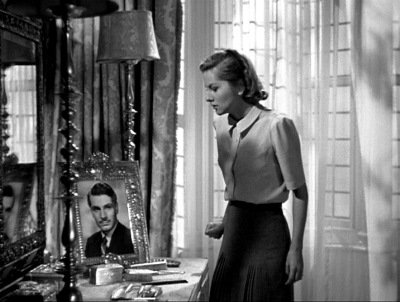Rebecca Syndrome: Jealousy Over Your Partner's Ex

Does your blood boil when you remember your significant other’s old flame? Do you think that their previous love affair wasn’t healthy, but are also bothered when someone remembers it? Do you compare yourself with your current partner’s exes? In psychology, this is known as “Rebecca syndrome.” Why?
Rebecca is a novel by Daphne du Maurier published in 1938. It tells the tale of a woman that marries a widowed man. Everything is wonderful until the ghost of Rebecca, the man’s late wife, appears. This spirit starts to continuously talk the husband into separating from his wife. Besides being frightening, the ghost manages to make the man feel insecure about his decision to start a new family, which leads to new conflicts.
Rebecca tells her former husband, Maxim, that the “new girl” will never be good enough. That everyone talks about her behind her back, that no one likes her, that she’s not good for him, etc. The book was a hit at the time and was taken to the radio by the genius Orson Welles. It was also adapted to the big screen by the wonderful Alfred Hitchcock.
Rebecca Syndrome
Based on the novel, psychologists define those with “Rebecca Syndrome” as people who feel pathological jealousy over the ex-partners of their current significant others. Just as it happened in the book, jealousy is a ghost that haunts you when you’re faced with the memory of your current partner’s exes.
It may sound a bit strange or hard to understand, however, it happens a lot more often than you think. When someone suffers from Rebecca Syndrome, they strive to learn everything about their partner’s exes, with the intention of discovering something bad. This way, instead of having a relationship made up of two people, as it should be, it feels as if three people are sharing one bed.
This poses a huge problem for the development and functionality of the couple, since unfounded jealousy can affect a person’s normal behavior. In this case, the one who is jealous isn’t the one only who suffers. The subject of the jealousy suffers as well.

How to overcome jealousy
Firstly, learn to live with the ghost. Accept the fact that your partner has had previous romantic relationships. Secondly, understand that jealousy is a clear sign of insecurity and a reaction to a supposed threat, which may or may not be real.
Jealousy can also appear when someone considers another person their property. Anything that draws that person’s attention away — be it a person, object, animal or task — away feels like an attack. In the particular case of exes, you have to keep in mind that their history is part of the past. And we also have a past of our own.
It’s impossible to not compare ourselves. We do it all the time. We look at a photo of our significant other’s ex and start to think: “she’s so ugly,” “she could be dressed better,” or the complete opposite, “look how pretty she is,” “she’s so elegant.” If we suffer from pathological jealousy, it doesn’t matter what that photo shows. We’re always going to feel that the person is a threat, and we’ll react badly.
If you think you have a little bit of Rebecca Syndrome in you, if you can’t stop thinking about your partner’s ex, then it’s time you do something to better your self-esteem. It doesn’t matter how important that person was to your significant other. Remember that it’s in the past, and it shouldn’t come between the two of you now.
The only thing you will accomplish with that attitude is put your relationship in jeopardy. Try to not compare yourself to those exes, because you’ll only suffer by doing so. There are always going to be things they did better and some worse. Don’t beat yourself up over it.
This text is provided for informational purposes only and does not replace consultation with a professional. If in doubt, consult your specialist.








